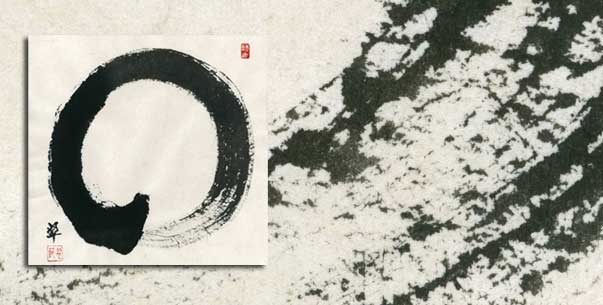|
|
who says that my poems are poems?
is it possible to engage in the world by withdrawing from it? talya rubin discusses the life of a recluse with three hermit poets

calligraphy by suien wada, www.japaneseshodo.com
I managed to coax three contemporary hermits out of reclusion and onto the telephone in a recent panel discussion on the hermit-poet tradition: Sonja Arntzen, David Budbill and Bill Porter. Sonja is a scholar and translator of the fifteenth-century Zen monk, Ikkyu. She recently retired as professor of East Asian studies at the University of Toronto to live on a small island off the coast of British Columbia. David is a widely published poet and playwright, greatly influenced by the ideals and poetry of Han Shan and other hermit-poets like him. His spirited mountain verse is performed with contemporary jazz musicians. David lives a self-sufficient life of reclusion with his wife in the remote mountains of northeastern Vermont. Bill, who often goes by the name Red Pine, is a renowned translator of the poetry of Han Shan and other classical Chinese poets. He lived in a monastery in Taiwan for several years and has traveled extensively in China. His book, Road to Heaven: Encounters with Chinese Hermits, is an account of his experiences seeking out hermits in the mountains of China.
Talya I wonder, can a hermit be defined?
Bill Well, it’s true it is hard to define a hermit because there are different traditions and the individual sensibility varies so much. It’s tough to be a hermit, and it is not for everybody. It’s for people who need to find themselves by themselves and not everybody wants to do that or is able to do that. One thing that characterizes all the hermits I have read about and met in China is that they are people who are very much an important part of society and they don’t see themselves as leaving society, but rather they are doing work that needs to be done so they can be better members of society.
David In Bill’s book Road to Heaven, Bill quotes Mircea Eliade talking about the tradition in Asia of shaman seers who are “withdrawn” from society and yet see themselves as an essential part of society, which I think is a good way to think about the hermit.
Talya There is also a struggle with language that comes up with hermit poets, the idea that literary activity is somehow a form of attachment to the world.
David I think there is a tension or a conflict between language and reclusion. Po Chü-i constantly bemoaned his poetry karma; he was constantly apologizing for his addiction to language. In Bill’s book Road to Heaven, he quotes one of the hermits as saying, “Taoists like it quiet” and I think Po Chü-i was acutely aware of that and he was always apologetic for his obsession with language.
Sonja If the ideal of being a hermit is to have a certain quietness of mind and feeling of connectedness and to have the petty self grow quiet so that you can feel the connection between the molecules of your own body and that of the tree that you are beside, when you feel those moments of calm the next impulse is to want to share that…
For more information on the Montréal Zen Poetry Festival, please visit: www.montrealzenpoetryfestival.ca
Talya Rubin practises in the Rinzai tradition of Zen Buddhism. Her writing has appeared in Grain, Matrix and Macleans Online and won the national Bronwen Wallace Award for poetry. After seven years in Australia, Talya recently returned to Montréal, where she teaches theatre and creates solo work for the stage.
|

